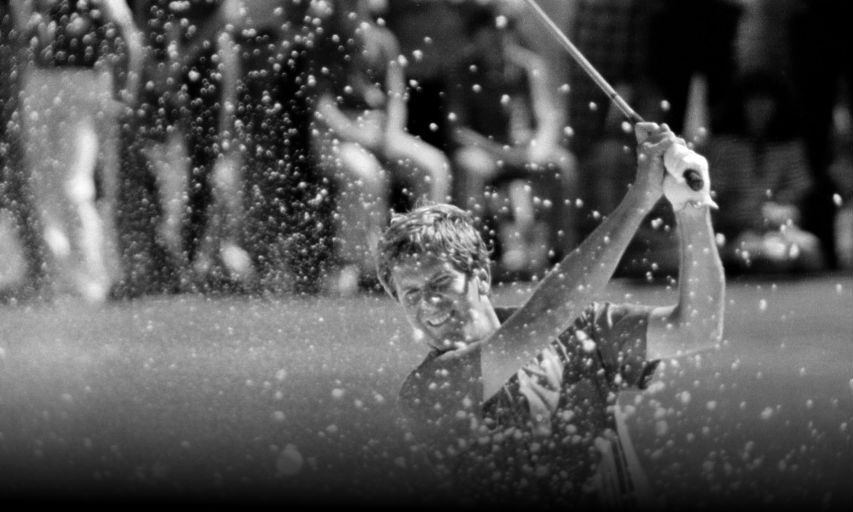Masters Sometimes Offers Only 1 Chance
- Details
- Category: Inside Golf
- Published: 2019-04-09

By DOUG FERGUSON, Associated Press
AUGUSTA, Georgia — Ed Sneed sat on a sofa in Butler Cabin at Augusta National looking as though he didn’t know what hit him.
He had a three-shot lead with three holes to play in the 1979 Masters and didn’t do anything horribly wrong, except nothing went right. He finished with three straight bogeys and faced a sudden-death playoff with Fuzzy Zoeller and Tom Watson, which Zoeller won with a birdie on the second extra hole at No. 11.
Arnold Palmer was conducting the interview in Butler Cabin and sympathized. So did Watson, who was sitting next to Sneed. Watson had lost in a three-way playoff the previous major at the PGA Championship, which cost him the career Grand Slam.
“I know what it feels like to be in that position,” Watson said. “All the condolences in the world wouldn’t fix what the hurt is right now inside of him. He’ll have plenty of tournaments left. He’s a great player. He showed it this week.”
There were other tournaments, sure, but Sneed played the Masters only three more times.
He never got another chance.
The hurt never really goes away.
“It’s something that sticks with you,” Sneed said from his home in Ohio. “I never won many tour events, but I’m remembered more for losing that one.”
At the Masters, he’s not alone.
The fabled green jacket is almost close enough to feel it slipped over the shoulders, and then it’s gone. And for some, the opportunity never returns.
Scott Hoch missed a 3-foot putt in a playoff in 1989 and lost to Nick Faldo on the next hole. Hoch at least had another chance six years later when he went into the final round one shot out of the lead, shot 73 and tied for fifth.
Greg Norman is not the most frequent runner-up at the Masters, just the most famous. He had more than one opportunity.
Not so for Chad Campbell in 2009, the first man out in a three-man playoff won by Angel Cabrera.
“It was early enough in my career, I felt like I was going to have a lot more opportunities to have a chance to win,” said Campbell, missing the Masters this year for the ninth straight year.
Not for Len Mattiace in 2003, who lost in a playoff to Mike Weir.
“It hurt that night,” Mattiace said. “I played Hilton Head the next week and it hurt the same. It didn’t really change ever.”
Sneed won four times on the PGA Tour — oddly enough, three were in a playoff — and he was right that he is known more for the one playoff he lost. For about a dozen years after that Masters, he could count on someone calling and wanting to talk about that shocking finish.
“I’ve replayed that many, many times in my mind,” Sneed said. “Actually, it’s the only place you can replay it because you can’t go back there.”
Mattiace’s only chance was in 2003, right after Augusta National had super-sized the golf course. Even with a bogey on the 18th hole, Mattiace shot a 65 in the final round and was on the verge of winning until Weir finished with two tough par putts.
The playoff effectively ended in one shot. Mattiace went first at the par-4 10th and tugged it left, stymied by a tree. He chipped through the green, and his par putt ran to the fringe. He missed that one, too, taking double bogey.
“I tried to keep perspective,” Mattiace said. “I had a great tournament. I shot 65. Everything was great. But when you get in that position, you want to cap it off and get a W. So I keep that perspective. But it hurts just the same.”
Later that year, Mattiace tore knee ligaments while skiing and when he returned to the Masters, he could barely walk and missed the cut.
That turned out to be his last Masters.
Campbell never expected to be in a playoff in 2009 until Kenny Perry bogeyed his last two holes. Suddenly, Campbell had the advantage. Perry had come up short of the 18th green. Cabrera was in the trees and hit another tree trying to get out. He managed to save par.
“I drove it perfect, just up the right side and had 162 yards,” Campbell said. “It set up perfect for me. I’d like to have that one back.”
He put it into a bunker, blasted out to 5 feet and missed the par putt. Cabrera won on the next hole.
Campbell returned to Augusta National the next year, with no reason to believe that would be his last year. He doesn’t let much in life linger. If anything causes him to think back, it’s the Masters.
“The longer it goes, you look back and feel like it’s the one that got away,” he said.
Chris DiMarco played in the final group two straight years at the Masters. He had faded long before Phil Mickelson made his 18-foot putt to win his first major in 2004. There was no fading against Tiger Woods in 2005. DiMarco pushed all day until Woods made birdie on the first playoff hole.
“I’ve never gotten more notoriety than finishing second in a major,” DiMarco said.
It was what he said that afternoon at Augusta that was so telling: “I will be ready to win next year.”
But he fell while skiing and injured his back on a bottle that was in his backpack and wasn’t quite the same. He played the Masters twice more and missed the cut.
And he never made it back.



